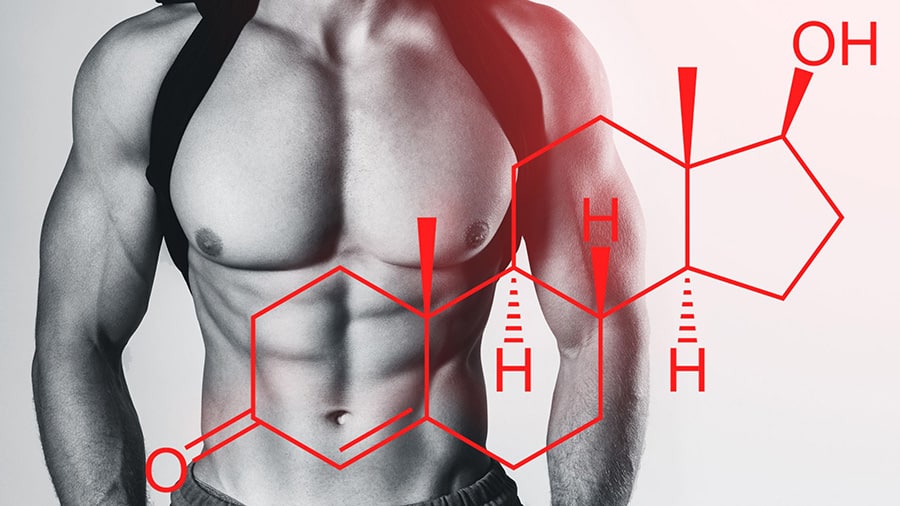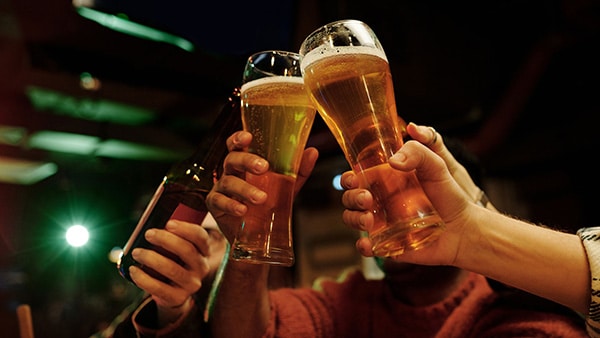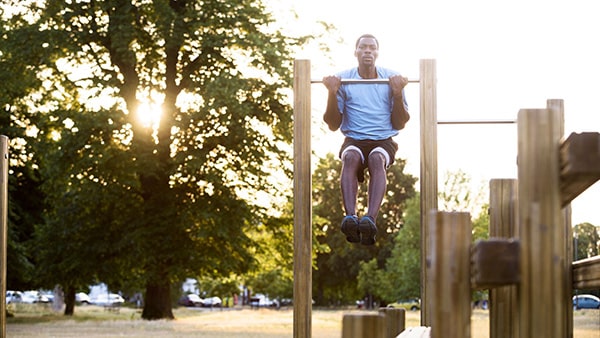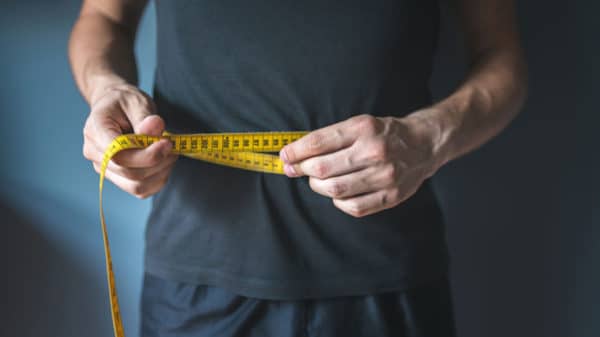Feeling tired or lacking motivation? Having trouble developing your muscles? A lower testosterone may be at the root of these difficulties. In fact, this male hormone governs numerous mechanisms in the human body, from libido and muscle strength to mood and even bone health. Maintaining adequate levels is therefore crucial to our general well-being and physical performance. Let's take a look 12 bad habits which could well be the cause of a drop in your testosterone levels.
1. Too much body fat
Many men today have a body fat content too high.
There are a number of reasons for this: a sedentary lifestyle, a diet too rich in processed products, etc.
Unfortunately, this is the first explanation for a drop in testosterone. In fact, fat cells convert testosterone into estrogen.
To maintain good hormonal health, it is therefore preferable to maintain a body fat percentage of between 10 % and 15 %.
If you are currently above this range, it is certainly necessary to lose weight by adopting a balanced diet and implementing a caloric deficit.
I can of course support you in this process through my personalized diet program.
2. Being inactive
This second point is directly linked to the first.
A lifestyle marked by inactivity, with long hours spent on the move. sitting positioncan lead to a drop in testosterone levels.
L'physical activity regularity is essential for maintaining high levels, as it promotes blood circulation and stimulates testosterone production.
In France, the recommendations of the French National Nutrition and Health Program (PNNS) stress the importance of sport. For adults, they recommend at least 30 minutes of moderate-to-high intensity physical activity a day.
This may include daily activities such as brisk walking or cycling, as well as exercise for muscle strengthening at least twice a week.
It's therefore essential to be active on a daily basis to maintain optimal testosterone levels.
3. Consuming endocrine disruptors
The endocrine disruptors are also responsible for a drop in testosterone.
These are substances that can interfere with our hormonal systemincluding testosterone regulation. They are often found in pesticides, plastics and personal care products.
Even if it's difficult to avoid these disruptors completely, it's important to take care to limit them. Whenever possible, choose organic fruit and vegetables to limit pesticide residues. You should also choose skincare products that are free of dangerous chemical elements, for better hormonal regulation.
Another important point concerns the impact of plastic on our health. The latter contains synthetic hormones and xenoestrogens that are detrimental to your well-being.
All you have to do is eat food or drink packaged in plastic, especially if you heat it in the microwave, to ingest plastic particles. Try to limit your use of plastic products and opt instead for wood, metal, glass or ceramics.
Atmospheric pollutants such as fine particles, polycyclic aromatic hydrocarbons and certain exhaust gases are also known for their endocrine effects.
4. Neglecting macronutrient distribution
Consuming proteins in excess, to the detriment of carbohydrates and lipids, is another factor in the drop in testosterone.
Of course, proteins are essential for muscular growth. That's why many gym-goers consume them in large quantities.
However, other factors should not be overlooked macronutrientsto avoid affecting your testosterone levels.
The fats are essential for the production of testosterone. Saturated and monounsaturated fatty acids, in particular, contribute to the synthesis of this hormone.
For their part, the carbohydrates play a role in maintaining hormonal balance. They help regulate cortisol levela stress hormone which can interfere with testosterone production when in excess.
That's why it's essential to adopt a balanced diet that takes all macronutrients into account.
5. Smoking
I'm certainly not telling you anything new when I say that smoking is bad for your health.
In addition to all the harmful effects of smoking, you should know that it can also harm your testosterone levels. Cigarettes create oxidative stress, which can damage testicular cells. These are the cells that produce testosterone in your body.
Smoking is also associated with lower levels of SHBG (Sex Hormone-Binding Globulin), a protein that helps regulate testosterone.
6. Drink alcohol
Drinking alcohol can clearly harm your testosterone. And your health in general.
Of course, we're not talking about the occasional glass. On the other hand, alcohol in excess is clearly responsible for a drop in this hormone, which it converts into estrogen.
To reduce your consumption, don't hesitate to implement strategies:
- Set limits for yourself.
- Alternate between alcoholic and non-alcoholic beverages.
- Choose alcohol-free activities.
7. Trouble sleeping
If you've already read this article on my blogYou know how important it is to get a good night's sleep when you're working out. This is because sleep is a real ally for testosterone.
A study monitored the testosterone levels of several men after a night's sleep. The results were clear: men who had slept only 4 hours had testosterone levels of around 200-300 nanograms per deciliter. Those who had slept 8 hours had testosterone levels between 500 and 700 nanograms per deciliter.
The lesson? The duration and quality of your sleep are both essential. And if you can't sleep between 7 and 8 hours a nightHere are a few tips to help you:
- Keep a regular sleep schedule.
- Avoid bright light before going to bed.
- Read a book instead of watching TV or your smartphone.
- Maintain a cool temperature in your bedroom.
- Eat enough magnesium.
If none of this works, you may want to consider taking a supplement of melatonina hormone that naturally helps you fall asleep.
8. Being stressed
Nowadays, we are all more or less victims of the stress.
Being stressed before an important deadline is perfectly normal, and sometimes even beneficial. Chronic stress, on the other hand, is bad for your health and your testosterone levels.
This is because cortisol, the stress hormone, causes many negative effects: muscle loss, fat gain, lower testosterone and a weakened immune system.
So, once we've established this, how do we combat stress?
You have several options: try the meditation and relaxation, go for walks in nature or consume adaptogenic plants such as ashwagandha or rhodiola.
9. Neglecting social relations
Lsocial isolation can contribute to a drop in testosterone levels in men.
According to Observatoire Français des Drogues et des Toxicomanies (French Monitoring Centre for Drugs and Drug Addiction)The confinement imposed during the Covid-19 crisis has shown negative effects on mental health and general well-being, with potential implications for testosterone levels.
So, to optimize hormonal health, it's crucial to maintain active social relationships.
10. Do not expose to sunlight
The vitamin Dproduced in the body during exposure to the sun, plays a role in testosterone synthesis. Studies have shown that men with higher levels of vitamin D also tend to have more sustained testosterone levels.
That's why it's important to get 10 to 15 minutes of exposure every day.
For people living in regions with little sunshine or who find it difficult to go outside regularly, it may be worthwhile to consume food supplements in vitamin D.
France's Agence nationale de sécurité sanitaire de l'alimentation, de l'environnement et du travail (ANSES) stresses the importance ofan adequate daily intake of vitamin D.
11. Eating too many processed foods
Your power supply has a major impact on your testosterone levels.
To keep testosterone production high, it's essential to eat a balanced and varied diet. Whole foods, lean proteins, fruit and vegetables and good fats should form the basis of your diet.
For example, excessive consumption of trans-fatty acids (unsaturated fatty acids), found in many processed industrial foods, can damage your body. hormone production and the quality of your sperm.
12. Not hydrating properly
Far too many people, whether or not they are sportsmen and women, neglect their hydration. But this is a crucial point.
Not only can dehydration negatively affect your performance at the gym, it can also lower your testosterone levels while raising cortisol levels.
So it's crucial to make sure you drink enough water.
A good tip is to drink a glass or two of water before each meal. Not only will this help you stay hydrated, but it will also reduce the amount of calories you consume during the meal, which can help the fat loss.
Conclusion
In conclusion, keep in mind that excess fat is one of the main factors that can reduce your testosterone production. But there are many other causes that can lead to a drop in this hormone. That's why it's important to adopt a sustainable lifestyle as healthy and balanced as possible. To find out more, I invite you to discover this other article on testosterone.










